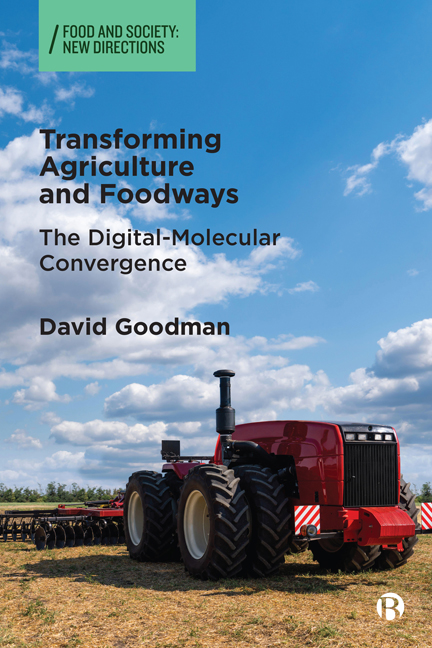Book contents
- Frontmatter
- Dedication
- Contents
- Series Preface
- List of Abbreviations
- Acknowledgements
- 1 Introduction: Technological Convergence and Change in Modern Agro-Food Systems
- 2 Precision Agriculture: Big Data Analytics, Farm Support Platforms, and Concentration in the AgTech Space
- 3 Precision Agriculture: Adoption, ‘Re-Scripting’, Farmer Identity, Path Dependence, and ‘Appropriationism 4.0’
- 4 Alternative Proteins: Bio-Mimicry, Structuring the New Protein Industry, ‘Promissory Narratives’, and ‘Substitutionism 4.0’
- 5 Agri-Biotechnology and the Failed Promises of the Seed-Chemical Complex, CRISPR and Gene Editing, and Regulatory Capture
- 6 Between Physical Space and Digital Space: COVID-19, Platform Capitalism, and Changing Patterns of Food Provisioning
- 7 Conclusion: Continuities in Change and Lost Opportunities
- Postscript
- Notes
- References
- Index
3 - Precision Agriculture: Adoption, ‘Re-Scripting’, Farmer Identity, Path Dependence, and ‘Appropriationism 4.0’
Published online by Cambridge University Press: 18 January 2024
- Frontmatter
- Dedication
- Contents
- Series Preface
- List of Abbreviations
- Acknowledgements
- 1 Introduction: Technological Convergence and Change in Modern Agro-Food Systems
- 2 Precision Agriculture: Big Data Analytics, Farm Support Platforms, and Concentration in the AgTech Space
- 3 Precision Agriculture: Adoption, ‘Re-Scripting’, Farmer Identity, Path Dependence, and ‘Appropriationism 4.0’
- 4 Alternative Proteins: Bio-Mimicry, Structuring the New Protein Industry, ‘Promissory Narratives’, and ‘Substitutionism 4.0’
- 5 Agri-Biotechnology and the Failed Promises of the Seed-Chemical Complex, CRISPR and Gene Editing, and Regulatory Capture
- 6 Between Physical Space and Digital Space: COVID-19, Platform Capitalism, and Changing Patterns of Food Provisioning
- 7 Conclusion: Continuities in Change and Lost Opportunities
- Postscript
- Notes
- References
- Index
Summary
In the previous chapter, we suggested that PA technologies and proprietary digital service platforms are intensifying the technology treadmill, reinforcing the dominant ‘productivist’ model and further extending corporate power over the agro-food system. This is convincing at a meta-level of analysis (see also Wolf and Buttel, 1996) but can give the false impression that technological innovation is an autonomous force in this socio-technical assemblage, uncontested by social actors, and fairly uniform in its consequences. A far more nuanced, less totalising view emerges when we examine the specificities of technology adoption and diffusion processes in US and EU agriculture and explore the contested issues these reveal.
Such specificities and contestations are better understood when seen against the backdrop of the long-term evolution of agrarian structures and their distinctive ‘divides’ and inequalities. At first sight, this may seem to be a lengthy, and somewhat unnecessary, detour. However, it highlights not only the socio-structural continuities of techno-scientific change over the past three decades but also the polarities it has produced and heightened. Attention to agrarian structures also provides a counterpoint to the micro-level analysis of innovation in PA that takes up most of this chapter.
Structural fault lines and change in US and EU agriculture: the last 30 years
Two well-turned phrases offer thumbnail synopses of the US agrarian ‘condition’ as depicted by metrics of concentration in farm size and farm incomes. The first of these phrases, revisiting its eponymous 1987 predecessor, is “Crisis by Design” (IATP, 2020). This report censures the last 30 years of farm policy inter alia for not alleviating the cost-price squeeze powering the ‘technology treadmill’ and farmer indebtedness, failing to articulate an effective response to climate change and extreme climate events, and neglecting the damaging effects of rising corporate concentration on farmers and rural communities.
The second phrase, ‘Get big or get out’, also figures prominently in the IATP report as a succinct summary of the structural inequalities exacerbated by the failings of US farm policy. This phrase, uttered in the 1970s by a former Secretary of Agriculture, Earl Butz, was loosely repeated in 2018 by Sonny Perdue, the Trump administration's Secretary of Agriculture.
- Type
- Chapter
- Information
- Transforming Agriculture and FoodwaysThe Digital-Molecular Convergence, pp. 21 - 35Publisher: Bristol University PressPrint publication year: 2023



